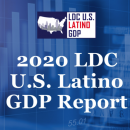By: Sean Salas, Forbes – Aug 27, 2020
Why would any anyone invest in undocumented immigrants in the U.S.? Aren’t credit default rates and costs higher in servicing this market? Aren’t immigrants at risk of deportation? Isn’t this anti-American?
As evidenced by the lack of access to capital or exorbitantly high interest rate loans inherent in the undocumented credit market, it is clear that most financial institutions (and even the government) err on the misconception that undocumented immigrants are too risky and not worth the investment. But the reality is this global pandemic has reaffirmed that undocumented immigrants tend to be the most resilient contributors to the U.S. economy and its credit markets.
In examining the credit behavior of undocumented immigrants, the closest proxy is using the 2019 Latino Small Business Survey to benchmark the credit scores of Latinx business owners versus non-Latinx business owners. In the study, Latinx business owners average a credit score of 588, reflecting an average credit score 11 points lower than non-Latinx business owners. However, averages can be misleading to the untrained eye. First, averages do not take into account the distribution of credit scores across both of these demographics, where the majority of distributed credit scores across both Latinx and non-Latinx credit scores are in the mid 600s. Second and most importantly, undocumented immigrants are less likely to have a credit score in the first place, which is perceived as “high risk.” In the absence of data, lenders (and FICO) do not give undocumented immigrants the benefit of the doubt, resulting in no capital or higher interest rate loans.
Another reason for mispricing credit for undocumented borrowers? These credits tend to be smaller, a lot smaller. Latinos, especially undocumented Latinos, tend to have a lower median household income of $42,500, almost $18,000 less than that of non-Latinx white households, according to a report by the Joint Economic Committee of the U.S Congress. This results in smaller credit needs measured by absolute dollars. The smaller average credit size makes it difficult for lenders to manage transaction costs to ensure these loans are profitable, unless they substantially increase interest rates. This is not an excuse. These costs can be mitigated by government or private subsidies and tax incentives deployed through banks, as well as Community Development Financial Institutions, among other community-driven lenders. Fintechs also play a critical role in lowering the transaction costs by using AI and machine learning models to more cost effectively and accurately underwrite credit for the underbanked. There are solutions —it’s only a function of designing a business model around the market opportunity.
Then comes the question of deportation risk, especially under this current administration. Here is the simple, and crude, reason why this market will not be deported at scale: Undocumented immigrants contribute $31.9 billion in tax receipts per annum, per New American Economy. Whether you like it or hate it, the U.S. boasts a capitalist economy. Just like the cannabis industry, undocumented immigrant businesses and workers are here to stay as the country cannot afford to roll back their disproportionate contributions to its economy. In a way, this is a form of direct or indirect exploitation that can no longer be tolerated. This trend can only be reversed by helping undocumented immigrants organize, articulate, and execute their economic and political power. Once again, like the cannabis industry, where there is the capital, there is an eventual path to legalization. According to numbers by the New American Economy, some industries would be crushed by the absence of undocumented workers including but not limited to the agricultural industry, where 36% of its labor force are undocumented. When coupling this market with the broader consumer purchasing power of the entire U.S. Latinx market, the total market contributes $2.3 trillion in GDP according to the Latino Donor Collaborative. The U.S. Latinx market is the 8th largest economy in the world, larger than Brazil, and almost twice the size of Mexico.
If Covid-19 has taught us anything about this safe bet, it is that undocumented individuals are resilient. Even when the probabilities of success are stacked high against them, the undocumented community stands strong as first responders in essential jobs or managing their businesses through a pandemic not seen in the last 100 years. Undocumented immigrants are still a long way from the level of capital required, and the lack of federal stimulus funds makes the matter worse. But rest assured, undocumented immigrants do not give up easily. If they can risk their livelihoods to come to this country in pursuit of the American dream, they will certainly rise to the challenge and defend that dream.
By: Sean Salas, Forbes – Aug 27, 2020







